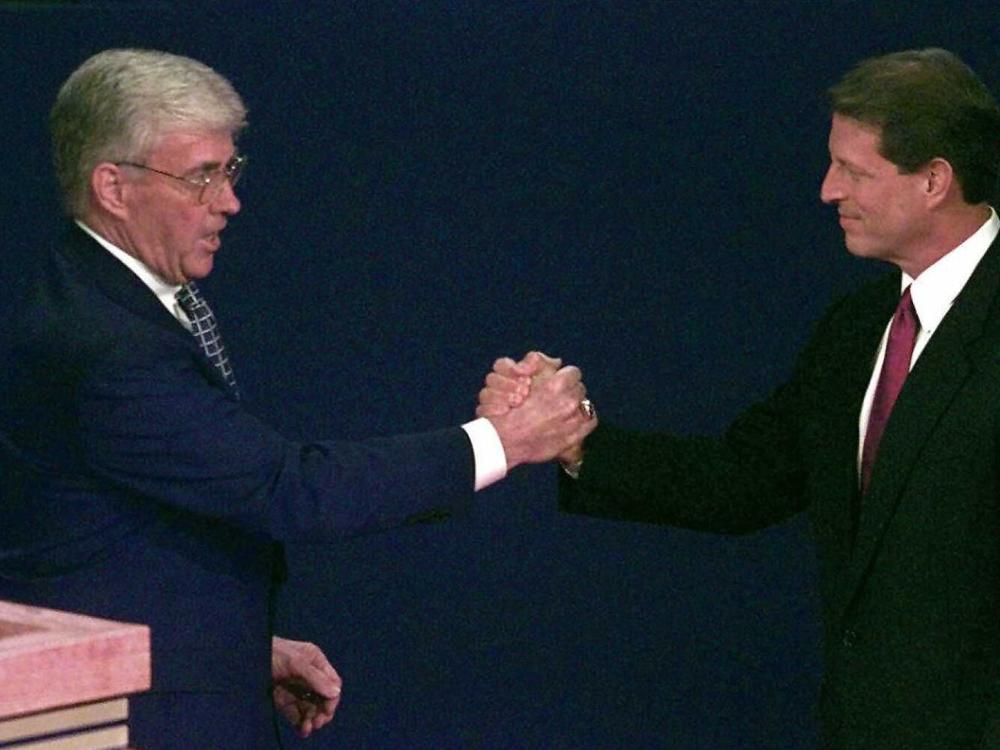Section Branding
Header Content
Vance and Walz are both veterans. Here's what it means to have a vet VP
Primary Content
For the first time since 1996, both major parties have picked a veteran for vice president -- a fact that some veterans' groups are celebrating, with the hope that it leads to greater understanding of military and vets issues.
That’s if it’s not all lost in a political slugfest of election-year personal attacks that threaten to degrade the public’s respect for veterans instead.
“Through all this noise you still have vice presidential nominees who raised their hand and said that if I am called to give my life for this country, I will do it,” said Rye Barcott, who leads With Honor, a political action committee dedicated to electing veterans who pledge to cross party lines.
“That is valuable and is something that we need more of,” Barcott says.
Their military backstories
Republican vice presidential nominee JD Vance served four years in USMC public affairs, including one uneventful six-month deployment to Iraq. He went from a broken home life to a GI Bill education that culminated at Yale Law School.
And he writes in his memoir Hillbilly Elegy of how the Marine Corps taught him adulthood.
“The day I graduated from boot camp was the proudest of my life,” he wrote.
Beyond drill sergeants screaming at him to get physically fit, they chaperoned his first grown-up decisions. When he bought his first car, a senior enlisted Marine steered him away from a sports car and a usurious loan.
Walz is also positive military role model from central casting: The high school teacher and coach, juggling his family and job with serving in his state National Guard one weekend a month and two weeks per year.
Walz joined the Guard when he was 17 years old. He’d just hit his 20 years for retirement when 9/11 happened, and he reenlisted. Over the course of his 24 years, he deployed for various natural disasters, and for one year to Italy in support of the war in Afghanistan.
Neither Vance nor Walz saw combat, which is much more the norm than many civilians realize. Both grew doubtful of the Iraq war, mirroring a majority of Americans. Walz talked about preventing America from deeper entanglement there when he first ran for Congress in 2004.
That doubt led the two men to different conclusions, made clear by their positions on Ukraine, where Walz supports American engagement to deter Russia, and Vance supports restraint (which his critics call isolationism.)
Either point of view is informed by military experience, which is a plus, says Allison Jaslow, CEO of Iraq and Afghanistan Veterans of America.
“Having lived experience of those who served in the military as a part of the next administration would be super valuable as we confront so many threats abroad,” she said.
Tale of 2 VAs
More than on foreign policy, a vet VP might influence the trajectory of the Department of Veterans Affairs, where experience suggests a second Trump administration would sharply diverge from a Harris administration.
Trump’s signature achievement for veterans was the 2018 VA Mission Act (which Trump incorrectly calls “VA Choice” at his rallies.) The 2018 law widened veterans’ options to use private health care if the distance or wait time for a VA appointment is too onerous. Having the choice is popular, but private medicine costs much more than VA care and isn’t demonstrably better. It’s one reason the VA is facing a $12 billion shortfall in the coming budget.
The bigger reason for the shortfall though is the Biden-Harris administration’s signature achievement: the PACT Act, which opened VA to hundreds of thousands of veterans exposed to toxins, from Agent Orange in Vietnam to burn pits in Iraq. After Biden signed the PACT Act, VA enrollment jumped 33% in the next two years.
A Harris-Walz administration is likely to continue expanding VA-based care to cope with the new influx. Trump and Vance would likely look for more ways to carve off parts of VA care to the private sector, as outlined in the Heritage Foundation’s Project 2025. While Trump has disavowed it, Vance has links to the project, and the section on VA was written by Brooks Tucker, former VA acting chief of staff under Trump.
Both laws are bipartisan compromises, something that still happens frequently on legislation regarding veterans. But which candidate ends up administering them going forward will have huge implications for the direction of the VA.
Records and partisan attacks
Vance’s short, two-year career in the Senate hasn’t yielded much of a record on veterans’ issues. Walz can point to his early role investigating traumatic brain injury and toxic exposure, a key law focused on preventing veterans suicide, and the expansion of the GI Bill in 2017.
Vance has started talking about veterans issues on the campaign trail, though he spends more time attacking Walz’s military record, which he says Walz embellished.
While Vance has been careful not to exaggerate his own record and his six uneventful months in Iraq, the man on top of the GOP ticket might overshadow that. Trump avoided serving in Vietnam, and over the years he’s made disdainful comments about wounded veterans and even those killed in action. In early August Trump spoke of Medal of Honor recipients in terms that the VFW labeled “asinine,” and at the end of that month the Trump campaign filmed an ad in Arlington National Cemetery, and verbally abused a member of the cemetery’s staff who tried to enforce the rules there.
Veterans advocates fear that using military service as a political cudgel only diminishes what has been one of the few American institutions to preserve public trust. While Americans say they prefer veterans as candidates, confidence in the military service has sunk nationwide, and the number of vets running for office dipped sharply this cycle, continuing a long slide from a peak in 1970.


